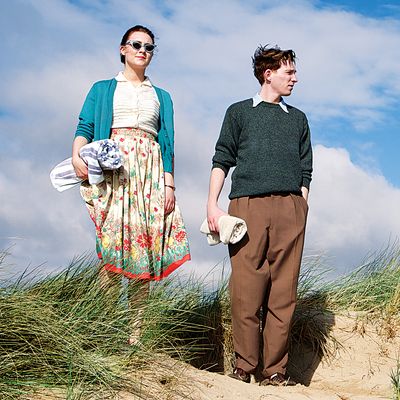
The film Brooklyn is a study in homesickness, which in this case means you ache for a place that, once upon a time, you were aching to leave. It’s the early 1950s, and the heroine, Eilis (pronounced Eye-liss) Lacey (Saoirse Ronan), seems dislocated everywhere. She’s unable to find a decent job in her hometown of Enniscorthy, in the southeast of Ireland, and she cuts too undemonstrative a figure at dances to attract suitors. (Her best friend is the hot ticket.) Her father is dead, her mother housebound, and her much older sister, Rose, busy with a demanding bookkeeping position. It’s Rose — fearful that Eilis will waste away in this stagnant culture — who arranges with a do-gooder priest (Jim Broadbent) for her sister to move to America, where Eilis will have a job behind a counter at a big department store and a room at a boardinghouse with young Irish ladies like herself. But in the teeming, multicultural Brooklyn, Eilis is so lonely that she freezes when people try to engage her in small talk. She reads letters from her mother and sister and weeps hopelessly.
She could be a drag, our Eilis, given her habit of letting other people make choices for her. But Ronan never lets the young woman’s passivity seem dull-witted or masochistic. The 21-year-old actress brings something unusual to every role: a combination of plainness and mysticism. Her blue-gray eyes give her a head start in the mysticism department; she can speak in low, gently inflected tones while still spooking the hell out of you. The plainness is in her pallor, and in an acting style so free of ornamentation that you wonder how she’s making you feel exactly what her character feels, see exactly what her character sees. Her Eilis moves gingerly, as if waiting for a stage manager to give her blocking, afraid of shaming “talk” even in a city as big as Brooklyn. But those uncanny eyes flash with anger, both at the small-minded people around her and her own cowardice. They see a world elsewhere.
The movie, directed by John Crowley, would be too soft and honeyed without Ronan. Nick Hornby wrote the screenplay based on Colm Tóibín’s novel, and he has been careful not to bruise Tóibín’s delicate — almost formal — exchanges. (Hornby has evolved into a first-rate screenwriter, but he can’t quite get loose here.) Probably for budgetary reasons, the film doesn’t suggest the scale of Downtown Brooklyn in the ’50s or Eilis’s amazement at seeing African-Americans, Jews, etc. Her chief culture shock arrives in the form of a slender, compact, soft-talking dreamboat of an Italian plumber named Tony, played by Emory Cohen with a James Dean slouch. Tony holds forth, eyes shining, on the construction business he’ll start and the houses he’ll build. He brings Eilis home to his family, who serve her spaghetti.
Eilis and Tony are such an obvious mismatch — physically, rhythmically — that you can’t quite buy it when the movie tells you they’re in love. But that incongruity turns out to be the mysterious quivering center of Brooklyn, which comes down to a choice between two ridiculously appealing suitors. She meets the second on a return visit to Ireland, where — perhaps as a result of her time in America — she’s instantly magnetic. Everything that didn’t come comes to her now, including Jim Farrell (Domhnall Gleeson), the tall, preppy-looking heir to a successful Enniscorthy pub with a grand house to boot. Ronan matches up physically with the sweet, courtly Gleeson, and with the cold sea and the pale Irish redheads. It’s an obvious fit. But is an “obvious fit” the key to being at home in the world?
Brooklyn is too graceful to pose the question so bluntly, suggesting instead — like much of Tóibín’s work — that Irishness is an existential condition characterized by frail roots and a pervasive sense of loss, and that maybe it’s better to get the hell out of Hibernia. The Irish tell beautiful stories and sing like fallen angels (there’s a soup-kitchen scene featuring one of those melancholy Gaelic solos that tear your heart out), but for every kind priest there are two or three mean-spirited harpies using religion as a cudgel.
Heaven forbid that should apply, though, to Julie Walters as Eilis’s Brooklyn landlady, Mrs. Kehoe, a woman with so many voluble conflicting impulses that she’s almost Oscar Wildean. Walters can pack it all into a single exchange — a lifetime of being prudish while hating prudes, of judging relentlessly while finding prejudice crass, of enforcing rules while half-admiring independence. Brooklyn doesn’t quite capture Brooklyn, but its ambivalence about being Irish is gloriously epic.
*This article appears in the November 2, 2015 issue of New York Magazine.


